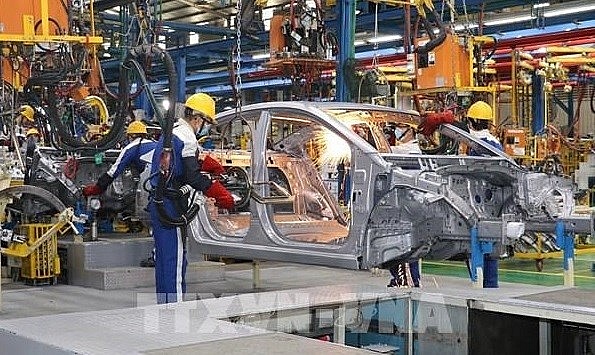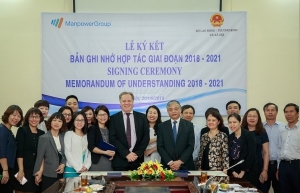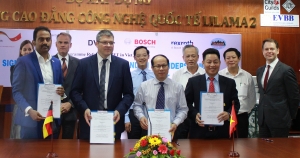Vietnam needs skilled workforce to become upper-middle-income economy by 2035: WB
Hanoi - Vietnam will need a skilled workforce to transform itself into an upper-middle-income economy by 2035, the World Bank has suggested in its recently-released report named “Taking Stock: Educate to Grow”.
 |
| Illustrative image (Photo: VNA) |
In its bi-annual report, the lender said: “Vietnam needs a workforce with 21st century skills to grow. As the economy moves from being driven by low skill and low wage jobs in manufacturing and services towards a more innovation driven growth model built on higher value-added industries and services, Vietnam’s workforce will need to attain higher level and more relevant skills.”
The Vietnamese Government’s Socio-economic Development Strategy for 2021-2030 says as much, aiming to use scientific, technological, innovative, and digitally transformative knowledge and build quality human resources as key drivers of higher productivity and future economic growth. To achieve these goals, Vietnam needs to reform its education system to improve quality and access, and thus provide the necessary skills to the population, it affirmed.
This edition also underlines transforming the higher education system as the key to boosting the country’s productivity and achieving its development goals, in the context where the country re-emerges from the pandemic and into a challenging global environment.
The report’s co-author Dorsati Madani said that while Vietnam’s economic recovery had been relatively stable, not all sectors witnessed the same situation.
The impact on workers and households during the crisis was serious and lasting, with about 45 percent claiming lower incomes in December 2021 than the previous year.
The impact of the pandemic is still present with businesses reporting broad-based labour shortages as of March 2022, which were felt more acutely in services and manufacturing, and in the Ho Chi Minh City area.
This, in addition to growth slowdown or stagflation in main export markets, further commodity price shocks, continued disruption of global supply chains, or the emergence of new COVID-19 variants, are hindering Vietnam’s full recovery.
Statistics revealed that Vietnam’s population has an average 10.2 years of schooling, second only to Singapore among the Association of Southeast Asian Nations (ASEAN) countries.
Vietnam’s human capital index is 0.69 out of a maximum of 1, the highest among the lower middle-income economies.
However, low skills relevance of the university graduates put the country in the bottom third of the 140 countries listed in the 2018 Competitiveness Index on skills relevance of university graduates.
A WB skills and enterprise survey published in 2019 also said that 73 percent of sampled Vietnamese firms report difficulties in recruiting employees with leadership and managerial skills, 54 percent with socio-emotional skills, and 68% with job-specific technical skills.
Focusing on tertiary and higher education, the WB’s report recommends reforming the education system to improve quality and access, and thus provide the necessary skills to the population.
Reforms to Vietnam’s higher education system could help support development objectives, the report says.
The increasing financial costs of pursuing higher education and the perception of diminishing economic returns from pursuing higher education have weakened demand.
While efforts to enhance the business environment are crucial to enabling job creation, policymakers should also take steps to reduce skill-mismatches and improve the quality of Vietnam’s labour force.
Carolyn Turk, WB Country Director for Vietnam, said: “To sustain economic growth at the desired rate, Vietnam needs to increase productivity by 2-3 percent every year.
“International experiences have shown that higher worker productivity can be achieved by investing in the education system, as an important part of a basket of investments and reforms. A competitive workforce will generate much-needed efficiency for Vietnam in the long term.”
In its report, the World Bank forecast Vietnam’s GDP growth to expand 7.5 percent in 2022 and 6.7 percent in 2023, with resilient manufacturing and a robust rebound in services serving as the driving forces for economic recovery.
 | Binh Duong businesess seek unskilled workforce Enterprises in Binh Duong province, one of the southern region's economic centres, need to recruit over 45,000 unskilled workers in 2015 to meet their production demands in garment, footwear and wood manufacturing fields. |
 | ManpowerGroup helps Vietnam develop skilled workforce for Industry 4.0 ManpowerGroup, a world leader in innovative workforce solutions, signed a memorandum of understanding (MoU) with the Ministry of Labour, Invalids and Social Affairs (MoLISA) yesterday to support Vietnam in developing a skilled workforce and effective regulatory frameworks for the digital age. |
 | Bosch supports training of highly skilled workforce towards Industry 4.0 Bosch's training project with the total investment of over €400,000 for three years is a part of the Vietnamese-German development cooperation in the technical and vocational education and training sector. |
 | Meeting skilled workforce demand in manufacturing and processing industry Machine learning, AI, and automation are shaping the evolution of the manufacturing and processing industry, a bright spot of Vietnam's economic recovery prospects. Experts from ManpowerGroup Vietnam, Thailand, and Middle East and the Institute of Labor and Social Affairs, Ministry of Labour, Invalids and Social Affairs have gathered to discuss sustainable solutions for workforce supply in the field. |
 | Developing human resources to adapt to new normal Human resources, especially skilled workforce, play a decisive role in the socioeconomic development of each country. As the Fourth Industrial Revolution gathers momentum in Vietnam, the development and nurturing of high-quality human resources to accelerate industrialisation and modernisation as well as internationalisation are especially essential to Vietnam. |
What the stars mean:
★ Poor ★ ★ Promising ★★★ Good ★★★★ Very good ★★★★★ Exceptional
Related Contents
Latest News
More News
- Citi economists project robust Vietnam economic growth in 2026 (February 14, 2026 | 18:00)
- Sustaining high growth must be balanced in stable manner (February 14, 2026 | 09:00)
- From 5G to 6G: how AI is shaping Vietnam’s path to digital leadership (February 13, 2026 | 10:59)
- Cooperation must align with Vietnam’s long-term ambitions (February 13, 2026 | 09:00)
- Need-to-know aspects ahead of AI law (February 13, 2026 | 08:00)
- Legalities to early operations for Vietnam’s IFC (February 11, 2026 | 12:17)
- Foreign-language trademarks gain traction in Vietnam (February 06, 2026 | 09:26)
- Offshore structuring and the Singapore holding route (February 02, 2026 | 10:39)
- Vietnam enters new development era: Russian scholar (January 25, 2026 | 10:08)
- 14th National Party Congress marks new era, expands Vietnam’s global role: Australian scholar (January 25, 2026 | 09:54)

 Tag:
Tag:



















 Mobile Version
Mobile Version